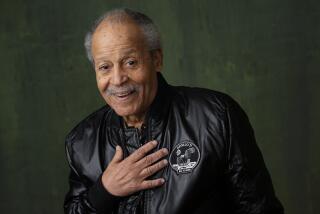Injunction Lets Test Pilot Keep Flying : Litigation: Kenneth M. Weir of Santa Ana, who just turned 60, can continue to fly for Lockheed, despite the companyâs retirement-at-60 rule. A court will decide the case.
A federal judge has issued a preliminary injunction allowing Lockheed Corp. test pilot Kenneth M. Weir to continue flying until a court rules on whether the aerospace firm can legally ground its pilots when they reach the age of 60.
âIâm real excited, Iâm thrilled to death,â Weir said from his Santa Ana home Tuesday. âIâm going to fly (today). Iâm gonna take off on a U-2 and go smoking off.â
U.S. District Judge Terry J. Hatter Jr. in Los Angeles issued the injunction late Monday at the request of the Equal Employment Opportunity Commission, which filed an age-discrimination lawsuit against Lockheed on Weirâs behalf. Weir turned 60 on Saturday.
The EEOC said that Lockheedâs policy of grounding pilots after the age of 60, allegedly because older pilots are not as mentally and physically fit to fly as younger pilots, was wrong. While the case may not be decided for another year, the injunction means Weir can stay at the controls--at least for now--of the U-2 and the TR-1 reconnaissance aircraft that he has been testing for Lockheed for 18 years.
Weir, who began flying when he was 18 and has piloted 235 different types of aircraft, said a battery of neuropsychological and other physical examinations have shown him to be in excellent health. He said he is not any more of an accident risk at 60 than he was at 59.
Lockheed has maintained that its policy of retiring pilots from flight is based on a similar rule by the Federal Aviation Administration that keeps commercial pilots from flying when they turn 60. A company spokesman said earlier that â. . . it is irresponsible to allow Lockheedâs high-performance test pilots to fly beyond the age determined to be safe for normal aviation.â
âWe established our rule consistent with the FAA for safety reasons,â Lockheed spokesman Scott Hallman said. âOur policy is meant to protect the individual.
âWe werenât arguing that the day (pilots) turn 60 they become more of a risk, but a guideline has to be established at some point,â Hallman said. âAt some point, pilots do become a greater risk.â
Karen Baker, an attorney for the EEOC, said the injunction is the first step in changing an industrywide policy of retiring pilots from flying after they turn a certain age.
âA preliminary injunction does not determine a precedent on the final issue,â she said. âNonetheless, it does represent a judicial finding that it is appropriate to retain a pilot after age 60, even if it is only for a year, and that does have an impact.â
Earlier this year, Baker was the lead attorney in another case brought by the EEOC on behalf of several pilots who charged Boeing with age discrimination because of a similar policy. The suit was settled out of court, and some pilots received cash payments and others got to keep their flying jobs.
More to Read
Inside the business of entertainment
The Wide Shot brings you news, analysis and insights on everything from streaming wars to production â and what it all means for the future.
You may occasionally receive promotional content from the Los Angeles Times.









